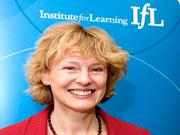A licence to practise in FE and skills

Whether you are a lawyer, a gas fitter, an engineer, or a teacher or trainer in further education and skills, the three essential ingredients of a licence to practise are being qualified; maintaining membership of your professional body; and staying up to date with practice in your field. In some professions, such as healthcare or teaching and training in FE and skills, a licence to practise is mandatory. In others, such as plumbing and human resources, it is the industry norm and you cannot get work without it.
In the UK, only 13.5 per cent of workers in the economy are required to hold a licence to practise. This is low compared with competitor economies, such as the US, the most deregulated economy in the world, where some 29 per cent of people in trades and professions are expected to hold a licence to practise.
A licence to practise gives the public confidence that they will get a professional and up-to-date service and this is what individual learners and companies will expect over the next few years when they have to pay more for further education courses and, in the case of individuals, perhaps take out loans to pay for course fees. They will expect a top-class, brilliant and leadingedge experience of teaching methods and subject or vocational area knowledge.
The license to practise through membership of the professional body, the Institute for Learning (IfL), and meeting our requirements for qualification and continuing professional development (CPD), means that teachers and trainers in further education and skills stand proud alongside other revered professionals, such as lawyers, accountants, nurses and midwives. Gaining the the public’s trust and confidence means that the sector is more likely to attract public and private sector investment for further education and skills courses and training.
Further education is a beacon for other sectors and industries, and plumbing is one example of a trade or profession where there is a growing interest in a licence to practise. Further education colleges and other providers are well placed to offer high-quality courses and vocational updating to industry, to support these licences. Our own professional teachers and trainers, with their licence to practise through IfL membership, will be delivering these programmes.
Individual teachers and trainers are now being asked to pay their own IfL membership fee, because the government is withdrawing its subsidy. We are aware that a number of employers are considering how they can support this for teachers or trainers. IfL has heard of some employers paying some or all of the fee because of the benefits and value they know they get for their organisation. Others will no doubt decide that the responsibility for paying the membership fee rests with the individual teacher or trainer, as they do with other staff in relation to membership fees for the Chartered Institute of Personnel and Development (CIPD) or an accountancy body, for example. IfL will explore other possible arrangements with employers.
The membership fees charged by professional bodies vary widely. Annual fees range from over £1,000 for a lawyer to £129.79 for healthcare support workers, £65 for childminders and £222 for social workers. The Royal College of Nursing charges £194.93 and the Royal College of Midwifery charges £230.16, in addition to which there is the requirement to be registered with the Nursing and Midwifery Council at £76. The standard membership fee of £68 for teachers and trainers in further education and skills makes IfL one of the least expensive professional bodies in the country.
Furthermore, IfL successfully negotiated with the government for some transitional funding, which has made it possible to extend the 2011–12 membership period to cover 18 months. Members will pay £68 for 1 April 2011 to 30 September 2012, which after tax relief at 20 per cent is £54.40, or less than 70 pence a week.
Most teachers and trainers are not accustomed to paying their own IfL membership fees, and the economic environment is tough. IfL recognises this, but has no choice but to start charging fees for 2011–12, as the government subsidy ends.
IfL was created in 2002 by teachers in further education, by trade unions, including NATFHE – now the University and College Union (UCU) – and employer bodies, including the Association of Colleges. We see teachers and trainers not as a workforce, but as professionals. We are proud of the professionalism of frontline teachers and trainers. Teachers and trainers deserve their own professional body, with similar expectations that membership in other professions involves – just as in health, social work and accountancy, to name a few parallels.
In further education and skills, the importance of world-leading teaching and training for tomorrow’s economy is unarguable. IfL parallels other well-regarded professional bodies in ensuring that those with a licence to practise in the sector are held in higher esteem and have the public’s trust and confidence.
Toni Fazaeli is the chief executive of the Institute for Learning (IfL), the professional body for teachers, trainers, tutors and student teachers across the further education and skills sector
Read other FE News articles by Toni Fazaeli:??
Food for thought – how FE catering teachers and trainers keep up to date











Responses